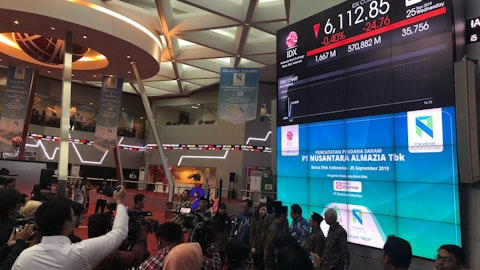Horst Zerbe: It’s yes, but I’ll let Frank comment.
Frank Pietrantonio: Yes. In terms of the results of €“ so we’re targeting the remaining recruitment would end, we’re estimating in June, and then you have to tack on €“ the patients have to be dosed for six months. So that’s why we’re looking at an estimate at the end of 2023. And at that point, close the database, and then you take a look at all the data, but the results…
Trevor Lee: How long would the data €“ like look, how long do you think that would take? Another few months or?
Frank Pietrantonio: Yes. Typically, the turnaround time is about one month to three months. So we close the database. And then we do the analysis and then create a report €“ study report based on results.
Trevor Lee: Okay. And then do you guys have like a rough plan for after that? Would it be a Phase 3 trial? Or when would that begin?
Horst Zerbe: Our strategy there is very clear. We will commit our own money only to completing this Phase 2 exploratory study, proof-of-concept study. The feedback that we are receiving from the market, from interested potential partners is such that they would contemplate entering into an agreement once we’ve been able to show the results of this proof-of-concept study. But we would not ourselves enter into any full-blown Phase 2 study. That would be the responsibility of any future partner.
Trevor Lee: Okay. But it would be another Phase 2.
Horst Zerbe: That would have to be the case, yes.
Trevor Lee: Okay. Yes. I think that’s all I had. Yes, I think that’s all I have for today. I appreciate it.
Horst Zerbe: Thank you.
Operator: Thank you. And we did have a follow-up coming from Hugh Kelly. Hugh, your line is live.
Hugh Kelly: Thank you. Regarding the Montelukast day release at the end of the year, Frank, is any feedback or intelligence I think Emory has been about five months since they completed their study. Any insights of they made progress or is that, I know the expectations were low on from prior calls, but are you hearing anything in that?
Frank Pietrantonio: Hi. Good question. We’ve been actively trying to get access to that information. I do know, however, that they initially were targeting 150 patients and then reduced that to 37 patients. And most unlikely, the reason is because of the pandemic, which imposed two years, we have not seen any of those results, which would be interesting. And would be nice to look at and share as well, so.
Hugh Kelly: Okay.
Frank Pietrantonio: But I have not yet seen anything.
Hugh Kelly: Okay. As a follow-up to that would €“ I appreciate that, Frank. Follow-up would…
Frank Pietrantonio: Okay. Sorry, go ahead, Hugh.
Hugh Kelly: I was just following up to the other gentleman’s questions. Once the data is reduced in 2024 presented, if it looks good, that’s when the €“ you open up the discussions with potential partners for Montelukast.
Frank Pietrantonio: Yes.
Hugh Kelly: Okay. And then my last question would be on the cannabis side, would the other film or film companies that do not have the breadth and depth of IntelGenx? Do you see them any of those emerging as potential competitors to our products?
Frank Pietrantonio: Not really. What we see is, and what we’re hearing in this space is that there is a €“ at this point still relatively small patient population that is firmly committed to the films and are €“ that are certainly repeat consumers. And so that’s €“ and so the objective in the industry is to systematically grow that patient base. And that’s what we’re targeting.
Hugh Kelly: Okay. And then €“ with the AdVersa product that’s on your technology, on the website, is there any interest in any partners entering in any collaborations on that product?
Frank Pietrantonio: We have more or less discontinued that. Tommy, maybe you want to comment on to the extent we can comment on what happened with AdVersa €“ with the AdVersa program?
Tommy Kenny: Yes. The AdVersa program was divested. So we sold this program and we still have a residual royalty to Tetra Bio-Pharma. So that’s been mucoadhesive though. It’s €“ they own the IP for Canada and the U.S. at the moment. If they’re not doing anything in the future, we might want to see if there is anything we can do. But at this point, we’re not pursuing anything. To be fair, we’re really focusing our business on film. And since this was not related to film, we decided to divest it at that time, and we still believe it was the best decision.
Hugh Kelly: Okay. Thank you.
Frank Pietrantonio: To add to that you, if we were contemplating any expansion of our technology portfolio, it would go into the transdermal space where we have actual conversations, because that is a natural extension of what we do with the films. It does essentially require the same manufacturing equipment. So that’s what we would be looking at if we contemplated our €“ a diversification of our technology portfolio.
Hugh Kelly: Okay.
Tommy Kenny: And also, if I can add, like, we are always developing new film platforms. So although for investor for the art side do well, sometimes it seems like a plug and play, but every active is a new platform and a new technology. And we’re constantly filing new application and patents to expand our technology portfolio for films and in the future transdermal.
Hugh Kelly: And the €“ if would €“ the two dates before the FDA get approval, is there milestone payments anticipated for the two products on approval?
Tommy Kenny: There’s one, yes. There is one milestone upon approval for RIZAFILM or RIZAPORT which is now which is, I think is due 60 days. But I don’t have the specific time, but there is a €“ I believe a $100,000 milestone. But there is one milestone for RIZAPORT for sure.
Hugh Kelly: Okay. All right. Thank you. Thank you.





